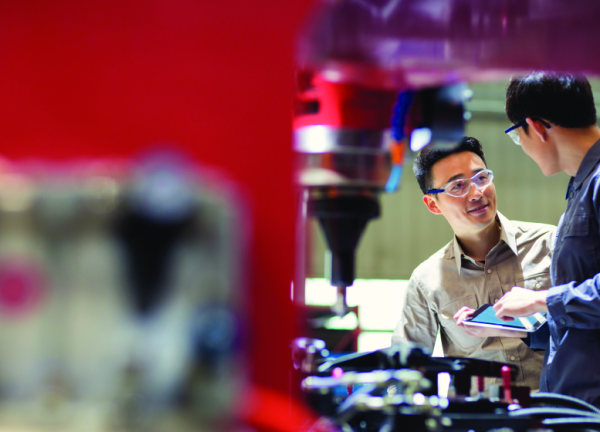When the company becomes a driving force of social protection
What if the 21st century company were more resilient and engaged? By reconciling their performance and responsibility, companies are committing to the common good. Welcome to the era of mission-driven, “belief-driven” companies that prefer action to words.

Companies in search of meaning are increasingly adopting a strong commitment to social responsibility. Working for the common good of their employees and society, they are differentiating themselves through their values – but above all through their actions. This is demonstrated by the Care by Saint-Gobain program, which guarantees minimum social protection for the Group’s 167,000 employees and their families.
What do businessman Andrew Carnegie and industrialist Henry Ford have in common? Both contributed, in their own way, to the emergence of a more philanthropic company focused on the common good. One by opening nearly 2,500 libraries in the United States, in order to give working-class communities access to culture. The other by doubling his employees’ wages to reduce workforce turnover in his factories. At the time, the approach was based more on the philosophy of “industrial paternalism”, which involved contributing to social progress by providing housing, schools and hospitals to workers and their families.
Did you know?
From paternalism to engaged companies
With new times, come new approaches. Over a century later, companies have moved away from paternalism. Now they aim to act for the common good and demonstrate their social side through a strong CSR (Corporate Social Responsibility) approach in line with their founding values. This need for consistency has brought about a lasting change, towards a more responsible and value-creating economic model.
This is the case for Saint-Gobain, which has recently launched CARE by Saint-Gobain. This vast social protection program covers all of the Group’s 167,000 employees and their families, all over the world. It covers medical check-ups, access to care, parental leave and even life insurance, supplementing government schemes when they are less extensive. “Solidarity is a principle deeply rooted in our corporate culture,” emphasizes Pierre-André de Chalendar, Chairman of the Saint-Gobain group. Guaranteeing each Saint-Gobain employee the same minimum benefits is a major step forward for the Group."
Actions and evidence
This is a major advance, but also a new direction, illustrating the extent to which companies are refocusing on their reason for being – their Ikigai, as the Japanese say. Engaged companies prefer actions and evidence to big speeches. Above all, they ensure that there is consistency between what they produce, what they say and what they do.
This is what it means to be a socially responsible, meaningful company, committed to its employees. “Solid and structured investments in the healthcare sector help to bring about a more prosperous society,” says Adriana Rillo, HR Director of Saint-Gobain Latin America. In fact, offering employees social protection helps to develop practices to improve social justice. For instance, it means the assurance of receiving better health care. In South Africa for instance, private medical cover remains very expensive and most employees cannot take it out without some form of subsidy from the company.
More motivation

So here we are in a new era, in which the company is demonstrating its social responsibility to the community. The good news is that this is a win-win situation for the company and employees. “This kind of social contract can reduce the incidence of chronic diseases (heart disease, cancer, stroke and diabetes) which are very expensive to treat,” says Adriana Rillo.
While there are multiple benefits in terms of health, that is also the case in terms of motivation. It is now well known that recognition and solidarity are fundamental to workplace well-being and strengthening them has a direct effect on employee involvement.
As a knock-on effect, this positive corporate culture promotes the brand image and helps attract new recruits. The current health crisis has only strengthened this phenomenon, in favor of even greater social responsibility. Candidates and employees aspire to join or work for a company that is more committed and engaged towards society. A company that facilitates access to a better lifestyle, by reconciling profitability and responsibility, performance and solidarity. Are we moving towards a “welfare company”? Towards greater awareness among brands?
The Care by Saint-Gobain programFive minimum benefits that apply (gradual implementation by the end of 2022) :
|
Credits: HD92/Shutterstock; Fizkes/Shutterstock
The latest stories
All stories
View more


